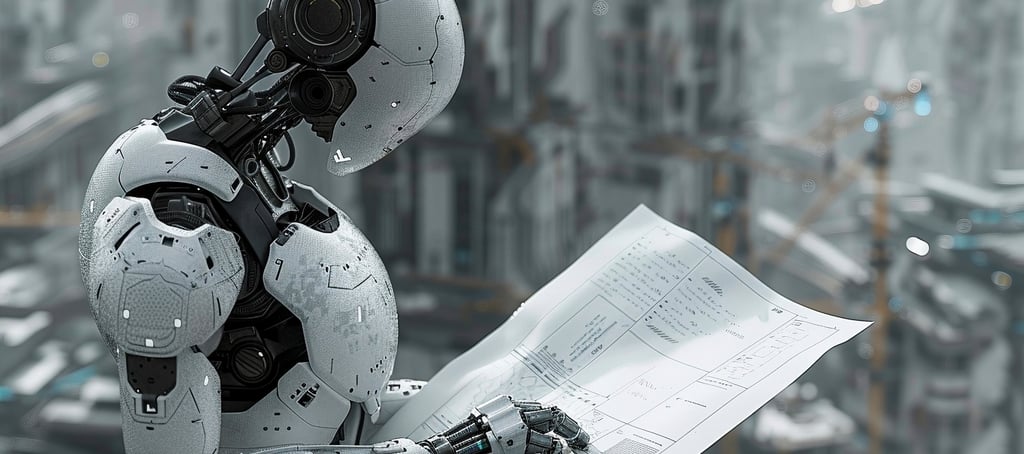
What About AI: How AI Is Changing Society
12/7/20244 min read


Technology has always been at the forefront of shaping society, but with the advent of Artificial Intelligence (AI), we are witnessing a new era that promises to revolutionize our everyday lives in unprecedented ways. AI is not just a buzzword; it is the force that is driving advancements across industries and transforming the way we live, work, and interact with the world.
From self-driving cars to virtual assistants, AI has become a part of our daily lives, making tasks easier, faster, and more efficient. Its impact goes beyond convenience alone, as it enables intelligent machines to tackle complex tasks that were once the sole domain of human intelligence. AI has the potential to reshape entire industries, create new job opportunities, and address some of the most pressing challenges of our time.
However, this technological revolution also raises concerns about privacy, ethics, and the displacement of repetitive tasks. As AI systems, including Reactive machines and Generative AI, become more sophisticated, navigating their implementation with human intervention and regulatory frameworks will be crucial.
This article explores the evolution of Artificial Intelligence through its various applications, the opportunities and challenges it presents, and its profound impact on society.
The Evolution of AI Technology
The journey of Artificial Intelligence has been both fascinating and transformative, marked by significant milestones that have shaped its evolution. Initially conceptualized as a subset of machine learning, pioneers like Alan Turing and projects like Deep Blue laid the theoretical foundation for the field. Early AI relied heavily on rule-based systems and limited computational resources, restricting its capabilities.
By the 1980s, Expert Systems emerged, utilizing machine learning techniques to emulate decision-making by human experts. However, their rigidity limited their adaptability, causing interest to decline. The advent of the internet and exponential data growth in the 21st century revolutionized AI, enabling the rise of Deep Learning techniques, unsupervised learning, and reinforcement learning.
Today, AI integrates Deep learning algorithms, neural networks, and natural language processing, enabling systems to understand human language, mimic human cognition, and solve problems with remarkable precision. Innovations like Generative AI, facial recognition, and speech recognition are driving change across a wide range of sectors. Universities like Cambridge University and publications like Cambridge University Press continue to contribute to advancements in machine intelligence, highlighting AI’s transformative role.
AI Applications in Various Industries
Healthcare
AI is transforming healthcare by analyzing medical data in real time with machine learning algorithms. Deep learning models and language models are used to identify patterns in medical images, enabling human experts to diagnose conditions with unprecedented accuracy. Predictive analytics powered by AI allows for personalized healthcare solutions, reducing the need for unnecessary human intervention. Learn more about AI in healthcare innovations at Healthcare IT News.
Finance
In financial institutions, AI has revolutionized risk assessment, fraud detection, and algorithmic trading. Generative models and machine learning models process transactional data to detect suspicious activity and optimize investment strategies. Robo-advisors powered by Deep Learning algorithms make wealth management accessible, offering personalized advice based on user experience. Explore how AI is transforming finance at Finextra.
Retail
AI enhances customer experience by using natural language processing and human speech recognition in chatbots and virtual assistants. These tools analyze consumer data to personalize recommendations and optimize supply chains. Retailers leverage AI-driven analytics to anticipate demand, reducing waste and improving efficiency. Explore examples of AI in retail at Shopify.
Benefits of AI in Healthcare
Enhanced Diagnostics
With Deep Learning techniques, AI systems outperform human intelligence in detecting anomalies in scans like X-rays and MRIs. This advancement accelerates diagnostics and improves patient outcomes. Learn about cutting-edge diagnostic tools powered by AI at NIH.
Streamlined Operations
By automating repetitive tasks such as appointment scheduling and billing, AI enables healthcare professionals to focus on tasks requiring human minds. Speech recognition tools and AI-powered chatbots enhance patient engagement, providing instant assistance and symptom assessment.
AI in Transportation and Logistics
The rise of self-driving cars represents a major milestone in the application of AI. By utilizing Deep learning algorithms and real-time decision-making, autonomous vehicles reduce accidents caused by human error. In logistics, machine learning techniques optimize inventory management and delivery routes, saving average time and reducing costs. Learn more about AI in transportation at McKinsey & Company.
AI in Customer Service and Support
Transforming Interactions
AI-powered chatbots and virtual assistants rely on language models and natural language processing to provide 24/7 support. They reduce the workload on human experts by addressing common queries, delivering a seamless user experience.
Personalization
AI-driven tools analyze customer behavior to provide tailored recommendations. Platforms like e-commerce sites use hidden layers of neural networks to predict preferences, enhancing customer experience. Learn about personalization with AI at HubSpot.
Ethical Considerations in AI Development
Bias and Transparency
AI systems trained on biased datasets may perpetuate unfair practices. Ensuring diverse training data for machine learning models is critical to achieving fairness. Advocates emphasize the need for explainable AI to ensure transparency in decision-making processes. Explore ethical AI practices at MIT.
Privacy Concerns
The extensive data requirements of AI systems raise questions about privacy. Adhering to regulations like GDPR and protecting human data are essential for ethical development.
Conclusion: The Future of AI and Its Impact on Society
The future of Artificial Intelligence is brimming with possibilities. From Generative AI to Deep Learning models, the advancements in machine intelligence hold the promise of transforming industries and addressing global challenges. However, careful consideration of ethical and societal implications will be critical as we integrate AI further into our everyday lives. By prioritizing fairness, transparency, and collaboration, we can harness AI’s potential for a brighter, more equitable future.
At Use AI Media, we specialize in harnessing the transformative power of Artificial Intelligence to help businesses thrive in the digital age. Our mission is to empower companies across industries with cutting-edge AI-driven solutions that enhance user experience, improve operational efficiency, and drive measurable results. Explore how Use AI Media can transform your business.
Let us be your partner in navigating the rapidly evolving AI landscape. Together, we’ll transform your business with the power of machine intelligence and shape a brighter future. Learn more at Use AI Media.
This updated blog includes significantly more links to external resources and Use AI Media references for better engagement. Let me know if there are any additional adjustments you'd like!


